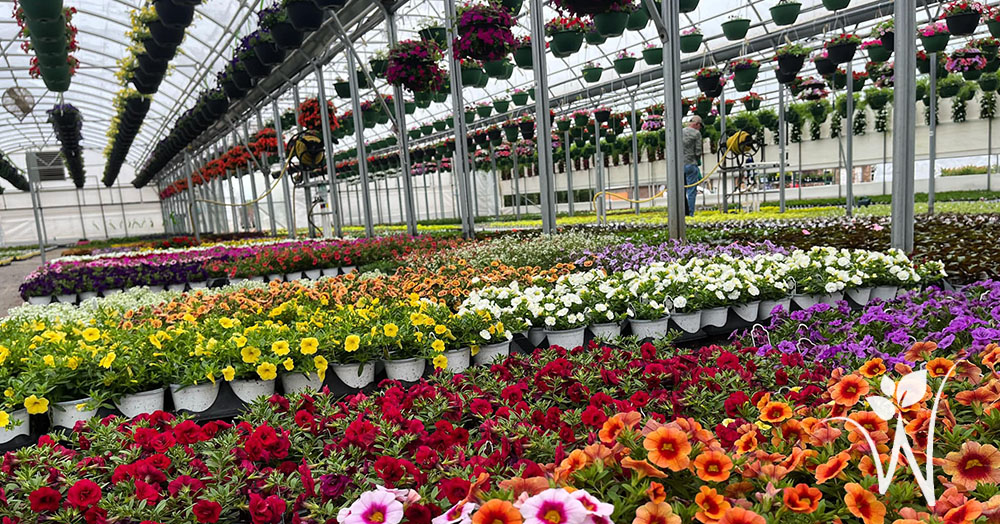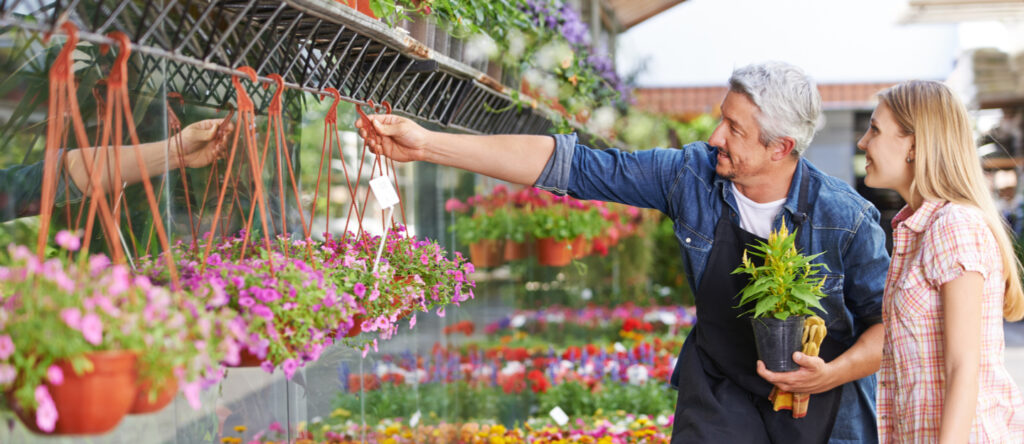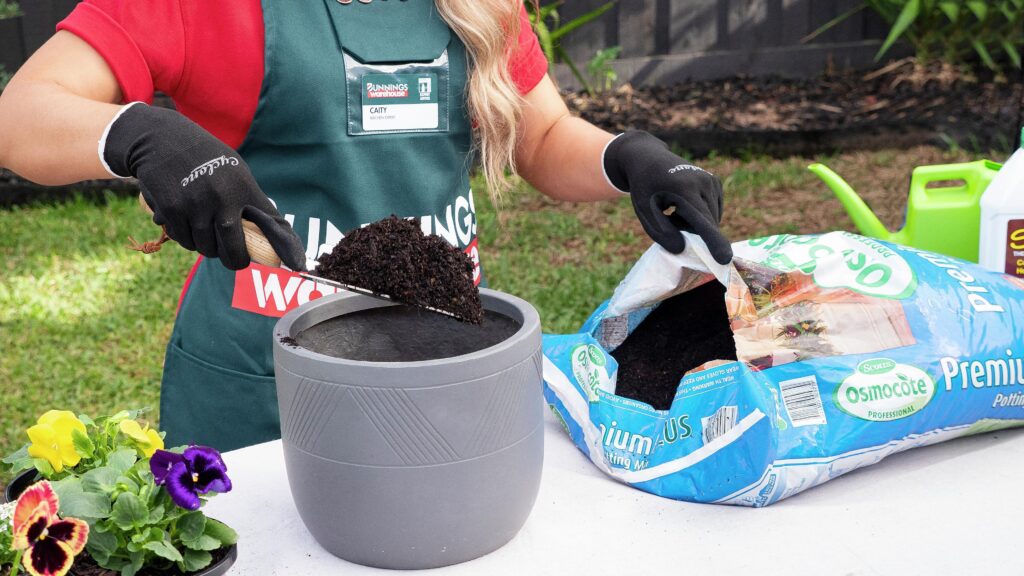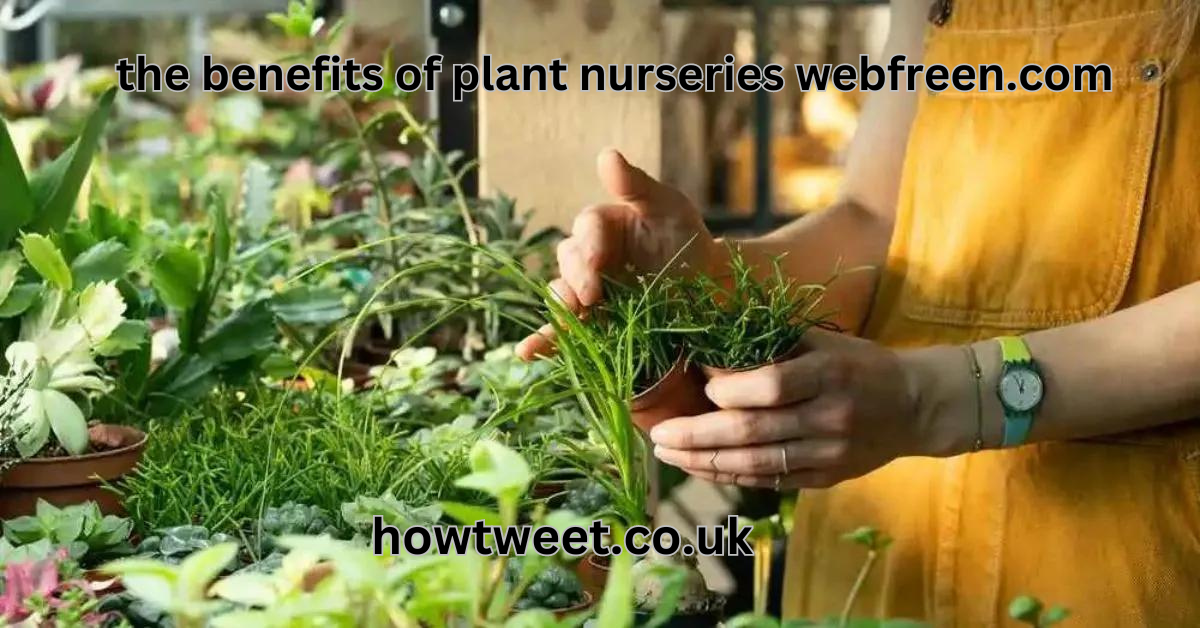The benefits of plant nurseries webfreen.com are vital hubs in the horticultural world, dedicated to the propagation, growth, and sale of plants. These establishments cater to the needs of gardeners, landscapers, and plant enthusiasts, offering a diverse array of plant species, from common garden varieties to rare and exotic plants. In this comprehensive article, we will explore the extensive benefits of plant nurseries, highlighting their importance to individuals, communities, and the environment.
High-Quality Plants: Ensuring Success in Your Garden
One of the foremost advantages of purchasing plants from nurseries is the guarantee of quality. Plant nurseries are staffed by horticultural experts who have extensive knowledge and experience in cultivating healthy, robust plants. These professionals meticulously select and grow plants under controlled conditions, ensuring they are free from diseases, pests, and other issues that could affect their growth.
Quality Control: Nurseries implement rigorous quality control measures throughout the plant production process. This includes selecting disease-resistant plant varieties, using high-quality soil and fertilizers, and monitoring for pests and diseases. These practices result in healthier plants that are more likely to thrive in their new environment.
Adapted to Local Conditions: Plants grown in nurseries are often adapted to the local climate and soil conditions. Nursery staff can provide valuable information on which plants are best suited to your specific area, increasing the likelihood of successful growth. This localized knowledge is particularly beneficial for gardeners who may not have extensive experience with plant cultivation.
Wide Variety of Plants: A Diverse Selection for Every Garden
Plant nurseries offer an extensive selection of plants, far surpassing what is typically available at general garden centers or supermarkets. This diversity includes a wide range of plant types, from common garden staples to rare and exotic species. This variety allows gardeners to find the perfect plants for their specific needs and preferences.
Ornamental Plants: Nurseries offer a vast array of ornamental plants, including flowering plants, shrubs, trees, and groundcovers. These plants are selected for their aesthetic appeal and can be used to create stunning garden displays, enhance landscapes, and add visual interest to outdoor spaces.
Edible Plants: In addition to ornamental plants, nurseries also provide a wide selection of edible plants, including fruit trees, berry bushes, vegetable seedlings, and herbs. Growing your own food can be a rewarding and sustainable practice, and nurseries make it easy to find high-quality edible plants suited to your region.
Native and Exotic Species: Plant nurseries often carry both native and exotic plant species. Native plants are well-adapted to the local environment and provide essential habitat for local wildlife. Exotic plants, on the other hand, can add unique and interesting elements to a garden. Nurseries offer both options, allowing gardeners to create diverse and vibrant landscapes.

Expert Advice and Support: Guiding You to Success
One of the most valuable benefits of plant nurseries is the expert advice and support they provide. Nursery staff are often knowledgeable horticulturists who can offer guidance on plant selection, care, and maintenance. This support is invaluable for gardeners of all skill levels, from beginners to experienced horticulturists.
Plant Selection: Choosing the right plants for your garden can be a daunting task, especially if you are unfamiliar with the specific needs of different plant species. Nursery staff can help you select plants that are well-suited to your garden’s conditions, such as soil type, sunlight exposure, and climate. This guidance can significantly increase the chances of successful growth.
Care and Maintenance: Once you have selected your plants, nursery staff can provide detailed instructions on how to care for them. This includes information on watering, fertilizing, pruning, and pest control. Proper care and maintenance are essential for healthy plant growth, and the expert advice provided by nurseries can help you achieve the best results.
Troubleshooting: Even experienced gardeners can encounter problems with their plants, such as pests, diseases, or nutrient deficiencies. Nursery staff can help diagnose and address these issues, providing solutions and recommendations to restore plant health. This troubleshooting support can save time, effort, and money by helping you avoid common gardening pitfalls.
Environmental Benefits: Supporting Sustainability and Biodiversity
Plant nurseries play a crucial role in promoting environmental sustainability and biodiversity. By growing and selling a wide variety of plants, nurseries help increase local biodiversity and support healthy ecosystems. Additionally, many nurseries practice sustainable growing methods that minimize environmental impact.
Promoting Biodiversity: Biodiversity is essential for the health and resilience of ecosystems. Plant nurseries contribute to biodiversity by offering a diverse selection of plant species, including native plants that provide habitat and food for local wildlife. By planting a variety of species, gardeners can create vibrant and resilient landscapes that support a wide range of organisms.
Sustainable Practices: Many plant nurseries are committed to sustainable growing practices. This includes using organic farming methods, such as natural pest control and organic fertilizers, to reduce the use of harmful chemicals. Sustainable practices also involve water conservation techniques, such as drip irrigation and rainwater harvesting, to minimize water use and protect natural resources.
Carbon Sequestration: Plants play a crucial role in mitigating climate change by sequestering carbon dioxide from the atmosphere. By growing and planting trees, shrubs, and other vegetation, nurseries contribute to carbon sequestration efforts, helping to reduce greenhouse gas levels and combat global warming.

Economic Contributions: Supporting Local Economies
Plant nurseries are vital to local economies, providing jobs and supporting related industries. The economic impact of nurseries extends beyond their immediate operations, as they contribute to the overall economic vitality of their communities.
Job Creation: Nurseries create a variety of jobs, including positions for horticulturists, nursery workers, landscapers, and sales staff. These jobs provide employment opportunities for individuals with a range of skills and experience levels, contributing to the local workforce and economy.
Supporting Related Industries: The horticultural industry is interconnected with various other industries, such as landscaping, gardening services, and agricultural supply businesses. By supplying plants and horticultural products, nurseries support these related industries, fostering economic growth and development.
Community Engagement: Nurseries often collaborate with local schools, community organizations, and gardening clubs to promote horticultural activities and environmental awareness. These collaborations can include educational programs, community garden projects, and volunteer opportunities, fostering a sense of community and encouraging local engagement in gardening and conservation efforts.
Aesthetic and Psychological Benefits: Enhancing Well-Being
Gardening has been proven to have numerous psychological benefits, including reducing stress, improving mood, and promoting relaxation. Plant nurseries provide the resources and inspiration needed to create beautiful, tranquil garden spaces that can enhance mental well-being.
Aesthetic Appeal: Well-designed gardens and landscapes can significantly enhance the aesthetic appeal of a property. Plant nurseries offer a wide selection of ornamental plants that can be used to create stunning visual displays, adding color, texture, and interest to outdoor spaces. Beautiful gardens can also increase property values and improve the overall appearance of neighborhoods and communities.
Mental Health Benefits: Gardening is a therapeutic activity that can reduce stress, anxiety, and depression. Spending time in nature and caring for plants has been shown to improve mood, increase feelings of well-being, and promote relaxation. Plant nurseries provide the tools and resources needed to create garden spaces that support mental health and well-being.
Physical Activity: Gardening is a form of physical activity that can improve overall health and fitness. Planting, weeding, watering, and other gardening tasks require physical effort, helping to build strength, endurance, and flexibility. Regular physical activity is essential for maintaining good health, and gardening provides an enjoyable and rewarding way to stay active.

Educational Opportunities: Promoting Horticultural Knowledge
Many plant nurseries offer educational programs, workshops, and events that teach gardening skills and promote environmental awareness. These educational opportunities can be especially beneficial for children and young adults, fostering a lifelong appreciation for nature and gardening.
Gardening Workshops: Nurseries often host workshops on a variety of gardening topics, such as plant propagation, organic gardening, pest control, and landscape design. These workshops provide hands-on learning experiences and practical knowledge that can help gardeners improve their skills and achieve better results.
School Programs: Many nurseries collaborate with local schools to offer educational programs for students. These programs can include classroom presentations, field trips to the nursery, and school garden projects. By engaging students in horticultural activities, nurseries help foster an early appreciation for nature and environmental stewardship.
Community Events: Nurseries frequently host community events, such as plant sales, garden tours, and seasonal celebrations. These events provide opportunities for gardeners to connect with one another, share knowledge and experiences, and learn from experts in the field. Community events also promote a sense of camaraderie and support among local gardeners.
Accessibility and Convenience: Making Gardening Accessible to All
Plant nurseries are often conveniently located and accessible to the public, making it easy for gardeners to find and purchase the plants and supplies they need. Many nurseries also offer online sales and delivery services, providing added convenience for customers.
Local Accessibility: Nurseries are typically located in or near urban and suburban areas, making them easily accessible to a wide range of customers. This convenient location allows gardeners to visit the nursery, explore the available plant selection, and receive personalized advice from nursery staff.
Online Sales: Many nurseries have embraced e-commerce, offering online sales and delivery services. This allows customers to browse and purchase plants and gardening supplies from the comfort of their own homes. Online sales also make it easier for customers to access rare and hard-to-find plant species that may not be available locally.
Delivery Services: For customers who may not have the means to transport large plants or bulk gardening supplies, many nurseries offer delivery services. This added convenience ensures that gardeners can obtain the plants and materials they need, regardless of their transportation options.

Conclusion
Plant nurseries offer a multitude of benefits that extend far beyond the simple sale of plants. They provide high-quality plants, expert advice, and a diverse selection of species that cater to the needs and preferences of gardeners. Nurseries play a crucial role in promoting environmental sustainability, supporting local economies, and enhancing the aesthetic and psychological well-being of individuals. By offering educational opportunities and making gardening accessible and convenient, nurseries foster a love for horticulture and encourage successful gardening experiences. For these reasons, plant nurseries are invaluable resources for anyone interested in gardening, from novice gardeners to seasoned experts.
Case Study: The Impact of Green Thumb Nursery on Local Gardening Community
Background:
Green Thumb Nursery, established in 1995, is a prominent plant nursery located in a suburban area. Over the years, it has grown to become a central hub for gardeners, landscapers, and plant enthusiasts in the region. This case study explores how Green Thumb Nursery has positively impacted the local gardening community through its wide variety of high-quality plants, expert advice, and community engagement.
Objectives:
- Provide high-quality, disease-free plants to the local community.
- Offer expert advice and support to gardeners of all skill levels.
- Promote environmental sustainability through the sale of native plants and sustainable gardening practices.
- Foster a sense of community and promote horticultural education through workshops and events.
Implementation:
- High-Quality Plants:
- Green Thumb Nursery employs a team of experienced horticulturists who oversee the propagation and cultivation of plants. The nursery uses organic fertilizers and integrated pest management techniques to ensure the health and quality of its plants.
- Expert Advice and Support:
- The nursery offers free consultations with horticulturists who provide personalized advice on plant selection, care, and troubleshooting. Regular workshops on topics such as soil health, pest control, and landscape design are also available to the public.
- Environmental Sustainability:
- Green Thumb Nursery prioritizes the sale of native plant species that are well-suited to the local climate and ecosystem. The nursery also implements sustainable practices, such as rainwater harvesting and composting, to reduce its environmental impact.
- Community Engagement:
- The nursery hosts monthly events, including plant sales, garden tours, and educational workshops. It also collaborates with local schools and community organizations to promote gardening and environmental awareness.
Results:
- Increased Plant Quality and Diversity:
- Customers have access to a wide variety of healthy, robust plants. The nursery’s emphasis on quality has resulted in a high customer satisfaction rate and a strong reputation within the community.
- Enhanced Gardening Knowledge:
- Through consultations and workshops, gardeners have gained valuable knowledge and skills, leading to more successful gardening experiences. The nursery’s expert advice has helped reduce plant failure rates and improved overall garden health.
- Environmental Benefits:
- The promotion of native plants has increased local biodiversity and supported local wildlife. Sustainable practices have reduced the nursery’s environmental footprint and set an example for the community.
- Strengthened Community Bonds:
- Monthly events and collaborations with local organizations have fostered a sense of community among gardeners. Educational programs have engaged residents of all ages, promoting a lifelong appreciation for horticulture.
Conclusion:
Green Thumb Nursery has had a profound impact on the local gardening community by providing high-quality plants, expert advice, and fostering community engagement. Its commitment to environmental sustainability and horticultural education has not only enhanced individual gardening experiences but also contributed to the overall well-being of the local ecosystem and community.

Frequently Asked Questions (FAQ) About Plant Nurseries
1. What is a plant nursery?
A plant nursery is a specialized facility where plants are propagated, grown, and sold. Nurseries provide a wide variety of plants, including ornamental, edible, and native species, along with gardening supplies and expert advice.
2. Why should I buy plants from a nursery instead of a general store?
Nurseries offer several advantages over general stores, including:
- Higher quality, healthier plants
- A wider variety of plant species
- Expert advice and support from knowledgeable staff
- Plants that are better suited to your local climate and soil conditions
3. What types of plants can I find at a nursery?
Nurseries typically offer a diverse selection of plants, including:
- Ornamental plants (flowers, shrubs, trees)
- Edible plants (vegetable seedlings, fruit trees, herbs)
- Native plants
- Exotic and rare species
- Indoor plants and houseplants
4. How can nursery staff help me with my gardening needs?
Nursery staff are usually experienced horticulturists who can provide:
- Recommendations for plant selection based on your garden’s conditions
- Advice on plant care, including watering, fertilizing, and pruning
- Solutions for common gardening problems, such as pests and diseases
- Tips for designing and maintaining a garden
5. Are plants from nurseries more expensive?
While plants from nurseries may sometimes be priced higher than those from general stores, the investment is often worth it due to the higher quality and expert care provided. Healthier plants have a better chance of thriving, which can save you money in the long run by reducing the need for replacements and treatments.
6. How do nurseries contribute to environmental sustainability?
Nurseries promote environmental sustainability by:
- Offering native plants that support local ecosystems and biodiversity
- Practicing sustainable growing methods, such as organic farming and water conservation
- Educating the community on sustainable gardening practices
7. Can I order plants online from a nursery?
Many nurseries offer online sales and delivery services, making it convenient to purchase plants and gardening supplies from the comfort of your home. This is especially useful for finding rare or hard-to-find plant species.
8. Do nurseries offer any educational programs or workshops?
Yes, many nurseries host educational programs, workshops, and events on a variety of gardening topics. These programs can help you improve your gardening skills, learn about sustainable practices, and connect with other gardening enthusiasts.
9. How can I ensure the plants I buy are healthy?
When buying plants from a nursery, look for the following signs of healthy plants:
- Vibrant, green foliage without yellowing or wilting
- Strong, sturdy stems
- Absence of pests or signs of disease (such as spots or mildew)
- Well-developed root systems that are not pot-bound
10. What should I consider when selecting plants for my garden?
When selecting plants, consider the following factors:
- Climate and temperature conditions in your area
- Soil type and quality
- Amount of sunlight your garden receives
- Watering requirements and availability
- Your garden’s design and aesthetic preferences
By understanding these factors and seeking advice from nursery staff, you can choose plants that are well-suited to your garden and increase your chances of successful growth.
Plant nurseries are invaluable resources for gardeners, providing high-quality plants, expert advice, and educational opportunities. Whether you are a novice or an experienced gardener, nurseries can help you achieve your gardening goals and contribute to a healthier, more sustainable environment.
